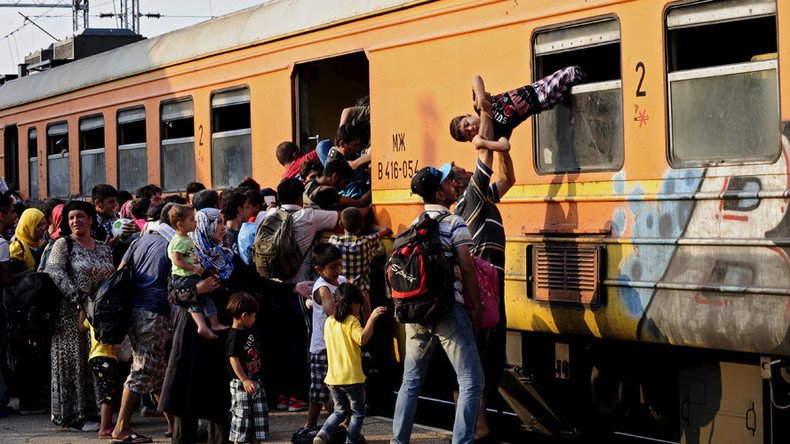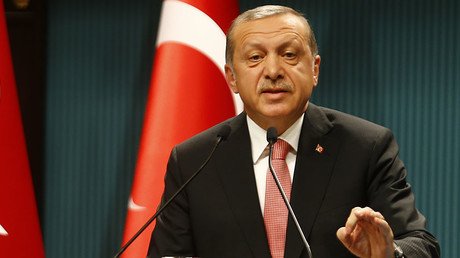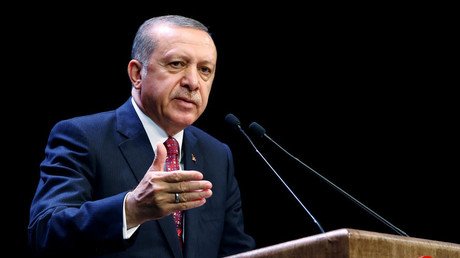Turkey to snub future migrant help for EU without visa-deal – Turkish minister

Turkey and the EU will have to find new ways to tackle the influx of migrants if the situation deteriorates, Turkey's European Union Affairs Minister Omer Celik warned, saying that Ankara will opt out unless the bloc approves visa-free travel for Turks.
While saying that “Turkey stands” with the EU migrant deal, Celik warned that if the situation in Iraq or Syria deteriorates, the migrant influx will again skyrocket. That would mean that “more powerful mechanisms will be required,” according to the Turkish official.
The statement followed a meeting in Bratislava, Slovakia, in which 28 foreign ministers from European Union member-states participated on Saturday.
"The (migrant) mechanism will not be enough ... so we need a new mechanism," Celik said, as quoted by AP. "And if (there is) no liberalization, Turkey will not be very positive in setting up a new mechanism."
The heads of EU member-states and Turkey reached a landmark deal in mid-March, sealing a joint plan to combat the migration crisis. The sides agreed to return all illegal migrants reaching Greece from Turkey's shores.
In exchange, the EU has to take in thousands of Syrian refugees directly from Turkey and give the country €6 billion ($6.8 billion) in funding over the next five years. The deal also aimed to ease the process through which Turkey could gain EU accession, which would allow visa-free travel within the Schengen Zone for Turkish citizens.
Yet the visa-free agreement has so far been postponed, despite a plan to introduce it in July, because Turkey has failed to comply with all of the EU's 72 criteria, the main stumbling block being a requirement that Ankara relax its anti-terrorism legislation.
Turkish President Recep Tayyip Erdogan already lashed out at EU authorities for the indefinite delay, threatening that “Ankara will no longer respect the March agreement on migrants” if the EU does not grant visa liberalization for Turkish citizens.
Minister Celik on Saturday declared that Turkey does not plan to make any changes to its anti-terrorism laws as they might affect the EU’s own security. Turkey borders both Syria and Iraq, where terrorists have seized large swathes of land.
“Turkey shouldn’t be expected to make any changes to its anti-terror law,” he said. “It’s about national security, Europe security.”
Celik also expressed dismay at the reaction the EU leaders had to Turkey after a failed coup attempt in July. Some 260 people were killed in the coup and over 2,000 more injured. Authorities in Ankara accused the US-based cleric and Erdogan’s critic Fethullah Gulen of masterminding it. Mass purges followed within all spheres of the Turkish society to find and eliminate Gulen’s alleged followers, which saw some 60,000 people in the military, judiciary, civil service, and education fired, of whom 16,000 have been arrested and detained. The West was highly critical of the post-coup crackdown.
“We believe that after the coup, we have not seen as much solidarity from the EU, as we expected to see. I made it clear [to EU foreign ministers], that our government is disappointed,” Celik said.
In the midst of the purges, Erdogan threatened to reinstate the death-penalty in the country to deal with those behind the coup attempt, sparking even more criticism from EU authorities and warnings that with the death-penalty made legitimate Turkey will never be allowed to join the bloc. Minister Celik, however, waved previous statements on the matter, claiming that the issue of death penalty is not on the agenda of the Turkish government.
“The death penalty is not on the agenda of the Turkish National Assembly, we’ve not made any decisions about the restoration of the punishment,” he said.
Celik emphasized, that his general impression of the talks with EU ministers was good and resulted in a “strong consensus” that the mutual relationship should not be limited to cooperation in the fight against terrorism and illegal migration and the sides should “further enhance cooperation.”














